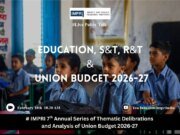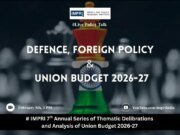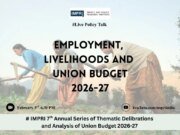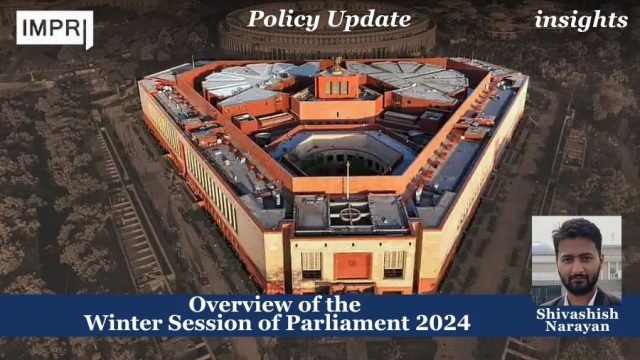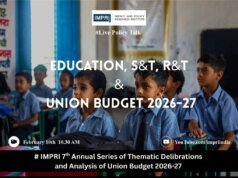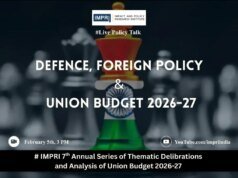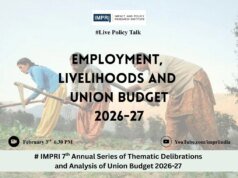Policy Update
Shivashish Narayan
The Winter Session of Parliament held from November 25 to December 20, 2024 was a period of significant legislative activity and parliamentary engagement also marked by considerable procedural challenges and disruptions. The Lok Sabha convened for 20 days while the Rajya Sabha met for 19 days during which various important matters were discussed and debated. However both houses functioned for significantly less than their scheduled time impacting the overall productivity of the session.
The session included the introduction of several new bills, detailed discussions on the Constitution and procedural motions that sparked considerable debate and scrutiny. The session also faced obstacles such as disruptions, reduced working hours and procedural hurdles that affected the overall efficiency. The performance of the session was also impacted by the low number of bills passed and the limited time allocated for private members’ business. These various factors combined to make the Winter Session a complex period of legislative and parliamentary activity with both achievements and limitations.
Legislative Business
During the Winter Session several key legislative actions were undertaken. A total of four new bills were introduced in the Lok Sabha: The Union Territories Laws (Amendment) Bill, 2024 The Constitution (One Hundred and Twenty-Ninth Amendment) Bill, 2024 The Merchant Shipping Bill, 2024 The Coastal Shipping Bill, 2024. Despite these introductions, only one bill, the Bharatiya Vayuyan Vidheyak, 2024 was successfully passed by both Houses of Parliament.
This legislation is intended to replace the Aircraft Act of 1934, updating regulations for the civil aviation sector. The bill was introduced on July 31, 2024 and passed by the Lok Sabha on August 9, 2024 and the Rajya Sabha on December 5, 2024 with a total discussion time of 9 hours and 46 minutes. Five other bills were passed by one house and remained pending in the other. The bills passed in Lok Sabha and sent to Rajya Sabha include The Oilfields (Regulation and Development) Amendment Bill, 2024; The Banking Laws (Amendment) Bill, 2024; The Railways (Amendment) Bill, 2024 and The Disaster Management (Amendment) Bill, 2024.
The government had planned to pass 16 bills and introduce 5, but the actual outcome was significantly lower. highlighting the challenges faced in achieving legislative goals. Planned bills for introduction also included The Indian Ports Bill, 2024 aimed at securing and regulating ports; The Punjab Courts (Amendment) Bill, 2024 which seeks to enhance the pecuniary appellate jurisdiction of Delhi district courts; and The Rashtriya Sahkari Vishwavidyalaya Bill, 2024 to establish the Rashtriya Sahkari Vishwavidyalaya.
These bills were part of the planned legislative agenda, but were not introduced during the session. The Railways (Amendment) Bill, 2024 was also listed for consideration and passing in the Lok Sabha; it was introduced on August 9 and passed on December 11. Other bills listed for consideration and passing included The Carriage of Goods by Sea Bill, 2024 The Bills of Lading Bill, 2024 and The Waqf (Amendment) Bill, 2024 but these remained pending at the end of the session.
The time spent on the passage of legislation varied. For example, The Railways (Amendment) Bill, 2024 saw 6 hours and 53 minutes of discussion in the Lok Sabha with 72 participants. In contrast, The Oilfields (Regulation and Development) Amendment Bill, 2024 had only 2 hours and 34 minutes of discussion. These varying discussion times reflect the different complexities and priorities associated with each bill. The Banking Laws (Amendment) Bill, 2024 had 4 hours and 58 minutes of discussion and 24 participants.
The Boilers Bill, 2024 had 2 hours and 45 minutes of discussion and 17 participants and The Disaster Management (Amendment) Bill, 2024 had 7 hours and 28 minutes of discussion and 49 participants. The Constitution (One Hundred and Twenty-Ninth Amendment) Bill, 2024 and The Union Territories Laws (Amendment) Bill, 2024 were introduced but not listed for introduction and both were referred to a Joint Parliamentary Committee on December 20, 2024. The Appropriation (No. 3) Bill, 2024 was introduced and passed on December 17, 2024 and was deemed to be passed by the Rajya Sabha.
Parliamentary Proceedings and Functioning
The parliamentary proceedings during the Winter Session were marked by a complex interplay of legislative business, debates and procedural challenges. The session was originally scheduled for 19 sittings however the Lok Sabha had 20 sittings. The Lok Sabha sat for an extra day on a Saturday to discuss the Constitution indicating the significance of this particular debate.
However both houses operated for a fraction of their scheduled time with the Lok Sabha functioning for 52% and the Rajya Sabha for 39% of their scheduled hours. In the first week of the session both Houses functioned for less than 10% of the scheduled time indicating a slow start and significant time loss. This reduced functioning was a significant factor contributing to the session’s overall performance.
A key highlight of the session was the discussion on the Constitution which took place for 16 hours in the Lok Sabha and 17 hours in the Rajya Sabha. This discussion occurred on December 13 and 14 in Lok Sabha with 136 participants and on December 16 and 17 in Rajya Sabha with 73 participants. The Prime Minister responded in the Lok Sabha discussion and a Minister replied to the Rajya Sabha discussion. This indicates the importance of the subject matter to the government and the parliament.
The Question Hour, a crucial mechanism for parliamentary scrutiny and accountability was significantly disrupted. In the Rajya Sabha the Question Hour did not function for 15 out of 19 days. Similarly in the Lok Sabha the Question Hour did not function for more than 10 minutes on 12 out of 20 days. This lack of proper functioning of the Question Hour significantly reduced the ability of the Members of Parliament to question the government on policy matters and administrative issues.
Furthermore, no adjournment motions were accepted or discussed in the Lok Sabha despite multiple notices. In the Rajya Sabha several notices were filed under Rule 267 but none were accepted or discussed. These motions allow for urgent matters of public importance to be debated and discussed.
The first supplementary budget for 2024-25 was discussed for 7.3 hours in the Lok Sabha and additional expenditure of ₹44,143 crore was approved. This indicates that financial matters were also a key area of focus during the session. There was no private member’s business in the Lok Sabha as two Fridays were lost to disruptions and one was used for the Constitution discussion. Private member’s business is an important opportunity for non-government MPs to raise issues. The Rajya Sabha discussed private member’s resolutions on only one Friday and both houses adjourned early on the last Friday of the session.
Procedural Motions and Incidents
Several notable procedural motions and incidents occurred during the Winter Session highlighting the complex dynamics of parliamentary processes. A significant incident was a notice to move a motion for the removal of the Vice-President (Rajya Sabha Chairman) which was submitted on December 10, 2024. This was the first such motion ever filed against a Vice-President marking it an unprecedented event in Indian parliamentary history. However, this notice was ultimately rejected by the Deputy Chairman of the Rajya Sabha on procedural grounds. Additionally, 55 members of the Rajya Sabha filed a notice to initiate proceedings for the impeachment of an Allahabad High Court Judge. This indicates an active effort by members of parliament to engage with judicial conduct.
The sources also reference past resolutions for the removal of the Lok Sabha Speaker and motions for the impeachment of judges in Parliament showing these actions are not unprecedented. Motions were brought against G.V. Mavalankar (1954), Hukum Singh (1966) and Balram Jakhar (1987) in the Lok Sabha with none of them being successful. Similarly, a motion against V. Ramaswami (Supreme Court) in 1991 did not pass in the Lok Sabha. While a motion against Soumitra Sen (Calcutta High Court) in 2011 passed in the Rajya Sabha the judge resigned before the Lok Sabha discussed the motion.
The 18th Lok Sabha has not yet elected a Deputy Speaker and the 17th Lok Sabha also did not elect one for its entire term highlighting an ongoing issue with parliamentary procedures. The Constitution requires the Lok Sabha to choose a Speaker and Deputy Speaker as soon as possible. In February 2023 the Supreme Court issued a notice to the government about the delay.
Session Performance and Productivity
The recent parliamentary session’s productivity was markedly lower compared to previous sessions. Historically, the Lok Sabha has achieved high productivity rates; for instance, during the Budget Session of 2022, it reached 129%, with 27 sittings and 13 bills passed. In contrast, the current session’s productivity was significantly diminished with both Houses functioning for less than half of their scheduled time.
This decline is further underscored by the number of bills passed. In the 16th Lok Sabha (2014-2019), Parliament passed a total of 131 government bills and 44 finance and appropriation bills. However, in the first six months of the 18th Lok Sabha only 15 bills were introduced with three referred to committees, indicating a substantial reduction in legislative activity. The disruptions during the Question Hour are also notable. In previous sessions such as the Budget Session of 2022, the Rajya Sabha achieved a productivity of 99.8%, with minimal disruptions.
In contrast, the current session saw the Question Hour functioning only 44% of the time in Lok Sabha and 21% in Rajya Sabha hindering parliamentary scrutiny of government actions. Additionally, the absence of a Deputy Speaker in Lok Sabha and the lack of discussions on private member’s business further contributed to the reduced productivity. In earlier sessions, such as the Budget Session of 2021, the Lok Sabha recorded 114% productivity, with 17 bills introduced and 18 bills passed. The current session’s performance falls short of these benchmarks, highlighting a significant decline in legislative output.
Conclusion
The Winter Session of Parliament 2024 was characterised by a mix of legislative activity and procedural obstacles. While some important bills were introduced and discussed the session was significantly affected by reduced working hours, disruptions and procedural motions that impacted its overall productivity. The lack of a Deputy Speaker in the Lok Sabha and the disruption to Question Hour further affected the parliamentary process.
Despite these challenges the session saw an important discussion on the Constitution reflecting the parliament’s commitment to addressing fundamental issues. The session aimed to address key legislative matters however these were impeded by the challenges the session faced. Overall, the Winter Session 2024 was marked by both successes and shortcomings highlighting the complexities of legislative and parliamentary functioning in a dynamic political environment.
References
- Covering The Winter Session Of The Parliament – IMPRI Impact And Policy Research Institute
- Session Alert
- PIB; https://pib.gov.in/PressReleasePage.aspx?PRID=2086475#:~:text=The%20Winter%20Session%2C%202024%20of,Sabha%20spreading%20over%2026%20days.
- Parliament Session Wrap : Winter 2024
About the Contributor: Shivashish Narayan is an Intern at IMPRI. He is a law graduate from Indore Institute of Law. His interest areas are policy and legal.
Acknowledgment: The author would like to express sincere gratitude to Dr. Arjun Kumar , Ms. Asthaba, Devananda and Arjun Brij for their invaluable contributions into this article.
Read more at IMPRI:


